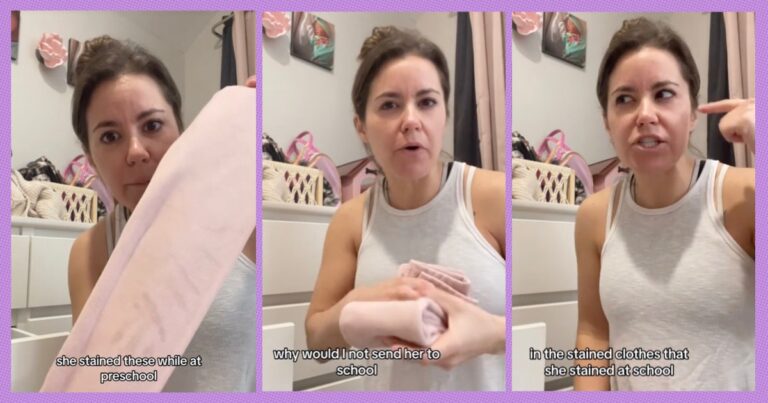
[ad_1]
Kids clothing is one headache after another. From every store making kids’ clothes with different measurements for the same sizes to kids growing so fast, there is no possible way to even keep up, there seems to always be some issue with kid’s clothing. Kids are also little messy goblins who are constantly spilling on themselves or producing grass stains out of nowhere.
One mom has just about had it with how stained her kid’s clothes get at school, and decided that if those clothes are clean but still stained, they’re still totally wearable.
“This is your reminder that it’s okay to send your kids to school in clean stained clothes,” TikTok mom Marla Branyan said in a viral TikTok video.
“I have a three-and-a-half-year-old. She goes to preschool. She’s stained these [pants] while at preschool. Why would I not send her to school in the stained clothes that she stained at school?”
“I’m not sending my kids to any type of school, no matter what age, in their 7-day best. It’s just not happening unless they are naturally less of a messy kid than my precious little three-and-a-half-year-old baby girl,” she continued.
“She’s messy. She’s living her best life and I will continue sending her in the stained clothes because I can’t afford to keep replacing these pants every single week. Okay, I can’t. And Goodwill only has a variety of patterns. They don’t have plain stuff.”
I can attest to her opinion on Goodwill. I buy most of my daughter’s clothes from Goodwill, but she’s right about basics and neutrals.
While resale shops are great for fun dresses or an adorable hoodie, finding plain clothes can be challenging. So, when you shell out $6-$8 a pop for a t-shirt from Target or Walmart and it’s stained within a minute, you best believe it’s still getting put in the wardrobe rotation.
In her caption, Branyan elaborated that not only will this ease stress on parents, but teachers and daycare providers as well.
“I think most preschool teachers and daycare providers would actually prefer kids NOT be in their nicest/name brand clothes bc it takes some pressure off the teachers/providers to help keep those clothes as clean as possible. Kids need freedom to be messy and dirty, and that preschool and daycare age is a great opportunity for that,” she wrote in the caption.
Her comment section was a mixed-bag with some TikTok users agreeing with her and others criticizing her viewpoint.
“Childcare worker- we appreciate the parents who let them get messy ❤️” one user wrote.
“I’m the director of an early childhood education center and it’s sooo much better when kids come in in play-able clothes! They eat! They paint!,” another said.
Another wrote, “Choosing a school that isn’t a fashion show has been my best decision. Let them be kids and get dirty”
One user pointed out, “It is irresponsible to continue to buy new and over consume.”
The OP replied, “Absolutely! And sometimes it’s also an issue of worrying about appearances too much & putting those worries on our little kids who should be enjoying preschool! 🥰🥰”
One user questioned the OP’s stained clothes mantra and wrote, “Do you go to work in clean stained clothes?”
“Wearing clean clothes reflects self-worth & discipline, showing that one values personal hygiene and respects oneself & others. It boosts confidence & mood, contributing to a + self-image & mindset,” another wrote.
The OP was quick to jump in, defending her stance and noting that stained clothing is morally neutral.
“Stained clothes do NOT = dirty. Stained clothes don’t mean you aren’t clean. Are you referring to adults or children in the rest of your comment?”
Others remarked that each parent should just do what’s best for them (of course!), but the OP wanted to elaborate on that notion.
“ur intentions matter & knowing which direction we’re more inclined to go (lazy or perfectionist) is helpful in determining why we do what we do & why we make the choices we make,” she wrote in the caption on a follow-up video, explaining that, as parents, the intentions behind our parenting decisions make all the difference.
[ad_2]